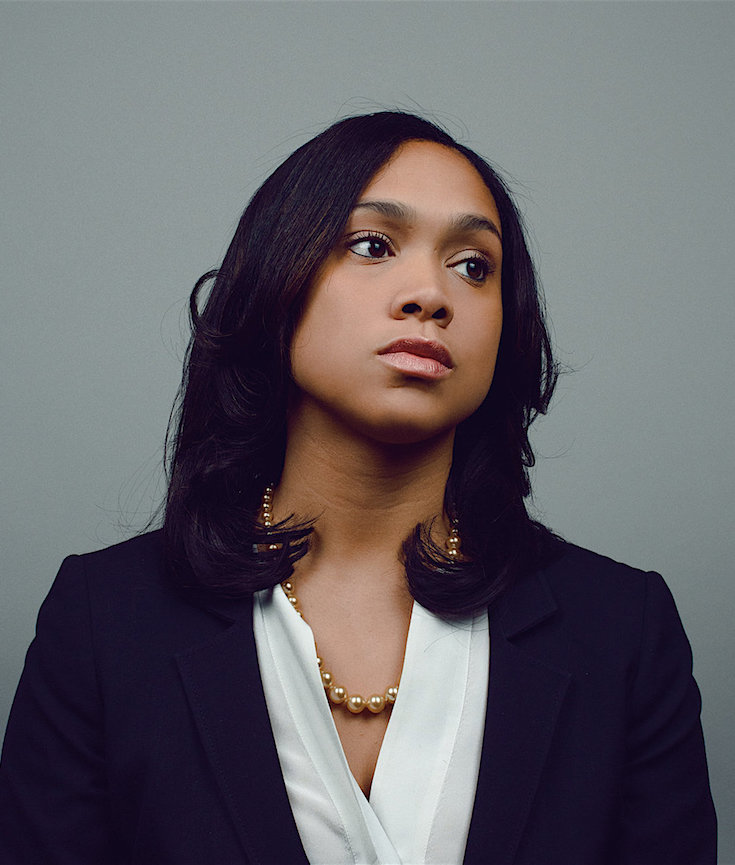[dropcap]A[/dropcap] little before 7 the other night, the prosecutor Marilyn Mosby stopped by my house in Baltimore for dinner. She was coming straight from work in one of her customary gray pantsuits, and because I was already nursing a beer, she took off her jacket with a sigh and poured herself a glass of white wine. Then we stepped onto the back deck to throw a few burgers on the grill. This being a September evening, you might imagine the yard in raking light and breezy autumnal aspect, but it was actually pretty swampy, the oppressive tonnage of summer humidity not yet given way to season’s end, so as soon as the burgers looked about done, we ferried them inside and settled at the island in my kitchen to eat. After a few minutes, Mosby’s husband, Nick, who sits on the City Council, knocked on my front door, let himself in and wandered through the house to join us. He took a seat two chairs down from Marilyn, leaving an empty one between them. [mc4wp_form id=”6042″]
“Hey, Marilyn,” he said quietly.
“Hey, Nick,” she said. “How are you?”
“Fine,” he said.
“How was your meeting?”
“What meeting?”
“Didn’t you have a Council meeting?”
“Oh,” he said. “That was a long time ago.”
She raised an eyebrow. “Then where are you coming from just now?”
“I was waiting for you at home,” he said.
Now she looked annoyed. “I called you at 6:07,” she said. “You didn’t answer.”
“Which number?” he asked.
“Your cellphone!” she said.
There was a long silence as Marilyn stared at Nick, who stared at the table. “Well,” he said, shaking his head. “I was at home.”
I relate this bit of conversation not because it offers a perfect window on the Mosbys and their marriage, but just the opposite: because it’s important to understand from the outset that what you are about to read is a narrow but intimate view. A couple in the midst of a public ordeal is not excused from life’s usual bothers, and what is striking when you find yourself in proximity to a crisis isn’t always the soaring arc of the fall but the way it touches against, grazes and refracts all the familiar daily torments on the way down.
 Annie Leibovitz, Vogue, July 2015 | Credit
Annie Leibovitz, Vogue, July 2015 | Credit
DEATH OF FREDDIE GRAY | BALTIMORE, MD
On April 12, 2015, Freddie Carlos Gray, Jr., a 25-year-old African American man, was arrested by the Baltimore Police Department for possessing what the police alleged was an illegal switchblade. While being transported in a police van, Gray fell into a coma and was taken to a trauma center. Gray died on April 19, 2015; his death was ascribed to injuries to his spinal cord. On April 21, 2015, pending an investigation of the incident, six Baltimore police officers were suspended with pay.
The circumstances of the injuries were initially unclear; eyewitness accounts suggested that the officers involved used unnecessary force against Gray during the arrest—a claim denied by all officers involved. Commissioner Anthony W. Batts reported that, contrary to department policy, the officers did not secure him inside the van while driving to the police station; this policy had been put into effect six days prior to Gray’s arrest, following review of other transport-related injuries sustained during police custody in the city, and elsewhere in the country during the preceding years. The medical investigation found that Gray had sustained the injuries while in transport. The medical examiner’s office concluded that Gray’s death could not be ruled an accident, and was instead a homicide, because officers failed to follow safety procedures “through acts of omission.” On May 1, 2015, the Baltimore City State’s Attorney, Marilyn Mosby, announced her office had filed charges against six police officers after the medical examiner’s report ruled Gray’s death a homicide.
Gray’s hospitalization and subsequent death resulted in an ongoing series of protests. On April 25, 2015, a major protest in downtown Baltimore turned violent, resulting in 34 arrests and injuries to 15 police officers. After Gray’s funeral on April 27, civil disorder intensified with looting and burning of local businesses and a CVS drug store, culminating with a state of emergency declaration by Governor Larry Hogan, Maryland National Guard deployment to Baltimore, and the establishment of a curfew. On May 3, the National Guard started withdrawing from Baltimore, and the night curfew on the city was lifted.
In September 2015, it was decided that there would be separate trials for the accused. The trial against Officer William Porter ended in mistrial. Officers Nero, Goodson, and Rice were found not guilty at trial. The remaining charges against the officers were dropped on July 27, 2016. (Wikipedia).


You must be logged in to post a comment.